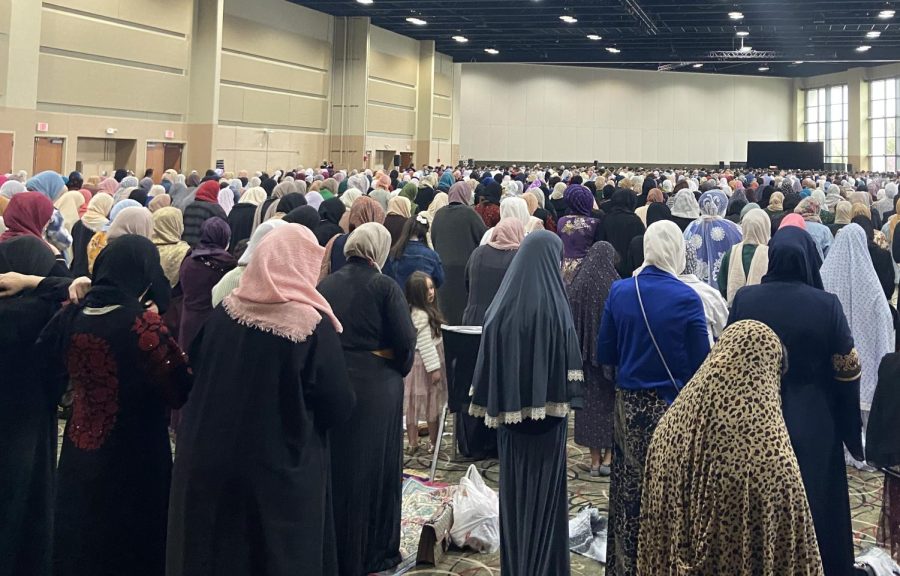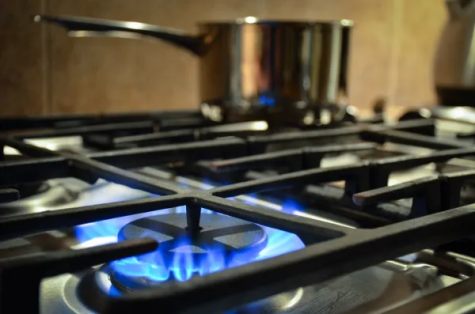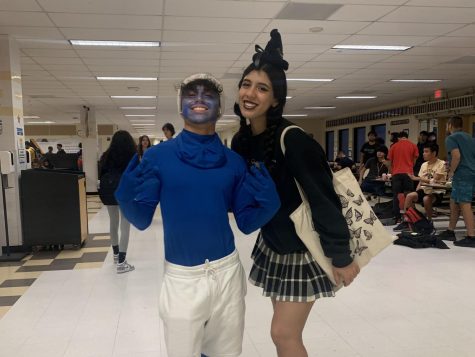Students observe Ramadan while managing school stress
Muslims stand for the morning Eid prayer in Tinley Park, IL.
The sun sinks below the horizon and the sound of the adhan, the Islamic call to prayer, resounds within the household. Children and adults crowd the table packed with water, dates and dishes of every flavor. It’s customary within the Islamic faith to break a fast with water and date fruit, as well as a short prayer that gives praise to god. Once that’s done, it’s time to dig in.
This past month, millions of Muslims around the world have been fasting for Ramadan, a month-long observance of fasting and worship for those who follow the religion of Islam. Each day, Muslims abstain from consuming all foods and beverages from sun up until sundown. Once the sun sets, they are free to eat and drink as they would regularly.
Muslims fast as young as 8 years old; however, it isn’t required for one to fast during Ramadan until a person reaches past the age of puberty. Once at the age, Muslims can only excuse themselves from it if they are sick, traveling, elderly, menstruating or breastfeeding. If you miss a day of fasting for any of these reasons, it’s required for that fast to be done again on another day of the year, or for charity to be given in replacement for the fast.
The purpose of fasting may have different meanings depending on each Muslim’s interpretation. Most would likely say it is a month intended to focus on the remembrance of God and the principles of Islam. Muslims make sure to pray five times a day, read from their holy book, the Quran, give charity to those in need and practice a month of peace and generosity.
Ramadan has been taking place during school this year, so Muslim students have been having to balance fasting and assignments all at once. For sophomore Huda Baraket, it hasn’t been too difficult to deal with.
“It’s been pretty easy, it’s just school weighs on it. It’s not a Muslim community, so there’s a lot of people not fasting, but it’s pretty easy overall.”
This is Baraket’s first year at Western, so even though many of the students are not fasting, she’s gotten the opportunity to meet a lot of those who are.
“I used to live in Miami and there weren’t a lot of Muslims around me. I’ve met a lot of Muslims here and we’ve started going to Mosques together and fasting together. It’s a new experience for me.”
Many of the teachers and students have been respectful and accommodating for this month of observance.
“Coach [Randy Weis] has been really nice; he delayed our PE midterm which was supposed to be this month for next month. He tells us to take it easy,” freshman Tessneem Jaber said.
With the underclassmen reporting a relatively easy Ramadan, it’s been a different story for the upperclassmen.
“In the past when I was younger, when I fasted, it used to be pretty easy. I remember my body got used to it quickly, but this year when I did it I felt very sick. I guess it’s just something that comes with growing up,” senior Ahmad Alarachi said.
Junior Lisa Kolley echoed some of Alarachi’s sentiments.
“It’s been tiring. I can’t do my homework because I’m sleeping so much. I would sleep when I was younger and I didn’t have to do work, and now I do. But it’s been fine, it’s tiring but I like it,” Kolley said.
Whether the month of Ramadan was difficult or easy, all can agree that they look forward to Eid-el-Fitr, a day-long celebration that takes place after the last day of Ramadan. Muslims celebrate in an array of ways, but the biggest act of the celebration is finally getting to eat with the sun up.
“Eating for the first time felt illegal. I usually drink water in the morning but when I went to drink water I had to pause and think if it was okay,” junior Donia Bahlawan said.









